A question from a soliloquy in Shakespeare’s Romeo and Juliet is appropriate to ask on Pentecost Sunday:
“What’s in a Name?”
In fact, there is a great deal in a name, for good or ill.
In the case of the forlorn Juliet, it was a question about the dividing power of names. She was an unwitting casualty of the feud between the Montague and Capulet families and was bitterly lamenting that her beloved Romeo bore the family name that kept them apart:
“’Tis but thy name that is my enemy… / O, be some other name! / What’s in a name? that which we call a rose / By any other name would smell as sweet.”
Such graceful writing!
But the virtue of a divine name is that it unites rather than divides. God draws all things to Himself, and the more we know of Him—His names, His essence—the more we love Him.
The Catechism of the Catholic Church explains that “’Holy Spirit’ is the proper name of the one whom we adore and glorify with the Father and the Son” (CCC, 691).
But the Holy Spirit has other names too—in fact, an inexhaustible number, in keeping with the nature of an infinite God. And the liturgy of Pentecost gives us a few of His most essential names for our edification.
But let’s not get ahead of ourselves. As with everything in the Church, there’s a history to this naming at Pentecost.

Of Ancient Origin
There is an ancient liturgical tradition in the Church which inserted hymns called “Sequences” into certain important liturgies. These special hymns were meant to follow (Latin: Sequere) the Alleluia and were thus sung right before the Gospel.
The one we sing on Pentecost is known by its Latin name: Veni, Sancte Spiritus or Come, Holy Spirit!
The hymn to the Holy Spirit was one of four ancient Sequences that became standard parts of the Catholic Mass after the Council of Trent (1545-63), but all of them were used in the liturgy for hundreds of years prior to the Council’s decree. These are the four:
- Victimae Paschali Laudes (sung at Easter) which dates back to the 1200s.
- Veni Sancte Spiritus (sung at Pentecost) dating to the 1300s or earlier.
- Lauda Sion (sung on the Feast of Corpus Christi), written by St. Thomas Aquinas around the year 1264. And
- Dies Irae (sung on All Souls Day and Masses for the Dead) also written about the same time.
To this list was added a fifth Sequence in the 1700s for the feast of the Seven Sorrows of Mary, the Stabat Mater (one of my favorites).
That’s an incredible pedigree, isn’t it?
Immensely Beautiful
The Sequence of the Holy Spirit is an immensely beautiful hymn. It is sometimes called the Golden Sequence because of its preeminence and splendor. Experts have called it a masterpiece of Latin poetry.
For that reason, it is best read in Latin to appreciate the beauty and simplicity of the rhyme scheme, but the traditional English translation, which I’ll use below, is also very lovely and expressive.
With numerous highly descriptive invocations of the Holy Spirit, the Veni, Sancte Spiritus expresses—albeit in a limited, human way— the essence of the Divine Person, to the extent that the human mind can even come close to fathoming that.
The names or titles used in this hymn are really just sparks of the divine fire, expressive images and metaphors that paint a word picture of an infinite Love that the human mind can understand.
You can read this wonderful sequence below. I’ve numbered the verses for easier reference. Below that I will tie the Sequence of Pentecost to what the Church has taught about the Third Person of the Blessed Trinity.
The Sequence
1. Holy Spirit, Lord of light,
From Thy clear celestial height
Thy pure beaming radiance give.
2. Come, Thou Father of the poor,
Come with treasures which endure,
Come, Thou Light of all that live.
3. Thou, of all consolers best,
Thou, the soul’s delightsome Guest,
Dost refreshing peace bestow.
4. Thou in toil art comfort sweet,
Pleasant coolness in the heat,
Solace in the midst of woe.
5. Light immortal, Light divine,
Visit Thou these hearts of Thine,
And our inmost being fill.
6. If Thou take Thy grace away,
Nothing pure in man will stay;
All his good is turned to ill.
7. Heal our wounds; our strength renew;
On our dryness pour Thy dew;
Wash the stains of guilt away.
8. Bend the stubborn heart and will;
Melt the frozen, warm the chill;
Guide the steps that go astray.
9. Thou, on those who evermore
Thee confess and Thee adore,
In Thy sevenfold gifts descend:
10. Give them comfort when they die,
Give them life with Thee on high;
Give them joys that never end.
The Holy Spirit is Pure Light
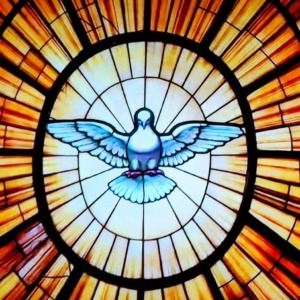 Verses one, two, and five of the Sequence especially point out this quality of Spirit: Lord of light, Light of all that live, Light immortal, Light divine.
Verses one, two, and five of the Sequence especially point out this quality of Spirit: Lord of light, Light of all that live, Light immortal, Light divine.
Like the light of the sun, we can’t see the Holy Spirit with our eyes, but His very presence sheds light on all things, particularly our minds and consciences.
We must pray for His Light often, especially when we are faced with an important decision or the need to discern right from wrong, or good, better, best in any given situation.
The Holy Spirit always comes when we call for enlightenment. Veni Sancte Spiritus!
The Holy Spirit is Advocate
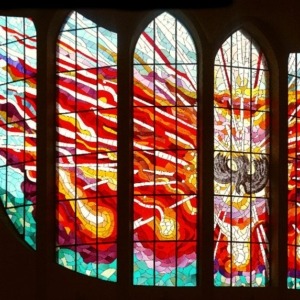 Expressed in the beautiful title, “Father of the Poor” from verse two, this title ties to Jesus’s words calling the Holy Spirit an Advocate or, in Greek, Paraclete (Jn 15:26), which He also calls the “Spirit of Truth” (Jn 14:17, 15:26, 16:13).
Expressed in the beautiful title, “Father of the Poor” from verse two, this title ties to Jesus’s words calling the Holy Spirit an Advocate or, in Greek, Paraclete (Jn 15:26), which He also calls the “Spirit of Truth” (Jn 14:17, 15:26, 16:13).
The definition of a poor person is someone who needs help in a time of crisis. In legal terms, an advocate is a defense counsel; in battle, he is a rescuer; in poverty and financial woes, he is a generous patron, a source of wealth, advice, and support.
The Paraclete always comes when we call for His assistance in our poverty. Veni Sancte Spiritus!
The Holy Spirit is Consoler
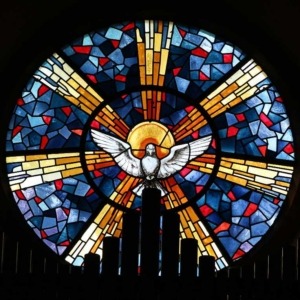 Called “Consoler”, “Comforter”, “Solace”, “Healer” in verses three, four, and ten, He comes to the individual soul as someone who alleviates sorrow and pain. How necessary this is in our wretched world!
Called “Consoler”, “Comforter”, “Solace”, “Healer” in verses three, four, and ten, He comes to the individual soul as someone who alleviates sorrow and pain. How necessary this is in our wretched world!
One cannot live without making mistakes, bad decisions, enemies, etc. These all-too human faults cause us to suffer in this life. And sometimes we are filled with grief for things beyond our control: the loss of a loved one, a failed venture, or being a victim of some injustice.
The Holy Spirit is “the soul’s delightsome Guest” (verse three). His mission is to dwell within us and strengthen us in times of trial.
The Consoler always comes when we call on Him in our sorrows. Veni Sancte Spiritus!
The Holy Spirit is Guide
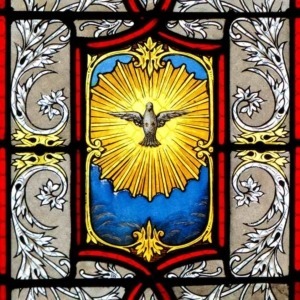 Jesus sends His Spirit to “guide the steps that go astray” (verse eight). But remember that the Holy Spirit helps us primarily in our greatest spiritual need: conversion of heart.
Jesus sends His Spirit to “guide the steps that go astray” (verse eight). But remember that the Holy Spirit helps us primarily in our greatest spiritual need: conversion of heart.
The Sequence says that He “bends the stubborn heart and will” to the will of God and melts hearts of ice. But this applies not only to the work of our personal conversion. We can also ask the Holy Spirit to bring conversion to our loved ones and any others who have gone astray and guide them back to the fold of the Church.
The Holy Spirit always comes when we ask for guidance in our darkened world. Veni Sancte Spiritus!
The Holy Spirit is Seven-Fold Gift
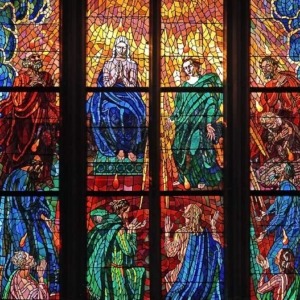 Verse nine speaks of the “sevenfold-gift” which is none other than the Holy Spirit Himself. The seven Gifts of the Holy Spirit are distinct realities but not separate from one another. They are the essence of the one Spirit of God (Catechism, 1831).
Verse nine speaks of the “sevenfold-gift” which is none other than the Holy Spirit Himself. The seven Gifts of the Holy Spirit are distinct realities but not separate from one another. They are the essence of the one Spirit of God (Catechism, 1831).
Wisdom | Understanding | Counsel | Fortitude | Knowledge | Piety | Fear of the Lord.
In other words, the Holy Spirit is the greatest gift that God has bestowed upon His Church, and He gives this gift to anyone, literally anyone who calls upon Him in faith (Lk 11:13). Veni Sancte Spiritus!
The Holy Spirit is Life and Joy
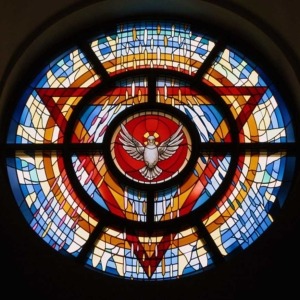 The final verse asking for “life with God on high” and “joys that never end” reflects our Church’s ancient Creed which calls the Holy Spirit the “Lord and giver of life”—such a profoundly beautiful title!
The final verse asking for “life with God on high” and “joys that never end” reflects our Church’s ancient Creed which calls the Holy Spirit the “Lord and giver of life”—such a profoundly beautiful title!
St. Paul says that the Spirit raised Jesus from the dead (Rom 8:11). Wow! There is no power on earth more capable of giving life than the Spirit of God. Death is no match for Him.
The Spirit’s joy, is of course, a result of that encounter with life (think of our reactions to newborn babies!), and He even heals depression when He encounters faith and is specifically invited into the soul of a depressed person.
We must call on the Holy Spirit who always comes when we need life and joy. Veni Sancte Spiritus!
Pentecost
I’m convinced that we don’t ask enough from God. We leave too many spiritual gifts on the table, languishing in disuse when God wishes to shower us with His grace. We simply cannot ask too much of an infinite God.
Pentecost, the birthday of the Church and feast of the Holy Spirit, is the time to ask for anything and everything we need. God will not deny His Spirit to those who ask.
And yes, a rose is beautiful by any other name, but the Holy Spirit is beautiful in every one of His names.
Veni Sancte Spiritus!
———-
[Note: This article is a reproduction of the Sacred Windows Email Newsletter of 5/19/24. Please visit our Newsletter Archives.]
———-
Photo Credits: Andre Carrotflower (Blessed Sacrament Church, Buffalo, NY); Nheyob (St. Michael Church, Findlay, OH); Braveheart (St. Lawrence Church, Sollenau); Aw58 (Wrocław); Romainbehar (CC0); Ввласенко (St. Vitas Cathedral, Prague); Zarateman (Our Lady of Mt. Carmel, Madrid); Holy Spirit Window (St. Peter’s Basilica, Rome, public domain).

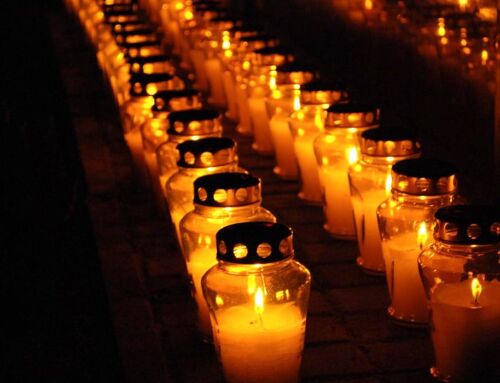
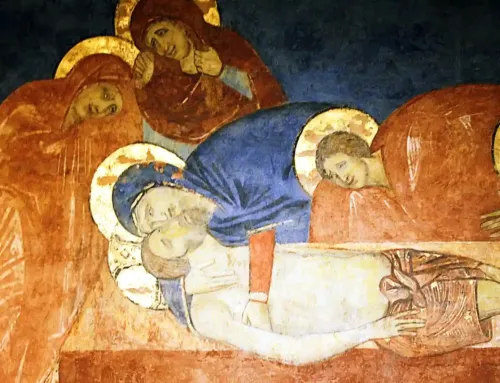
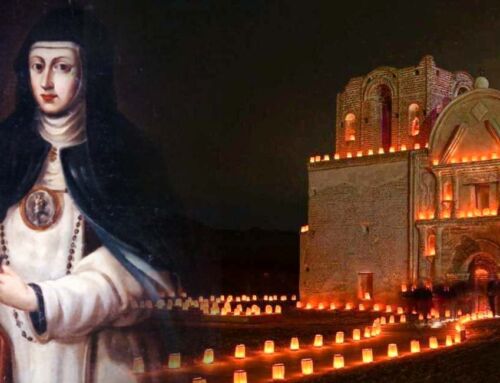
Leave A Comment